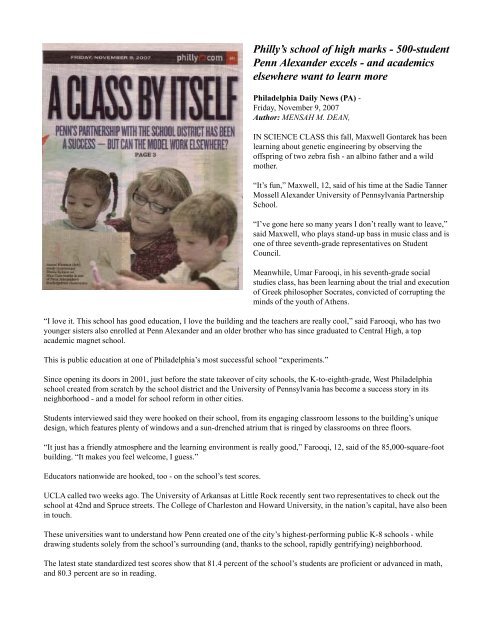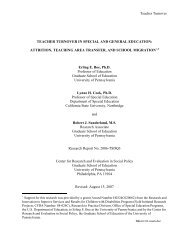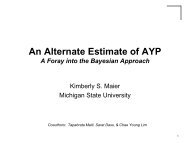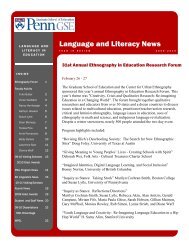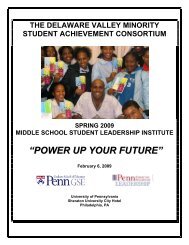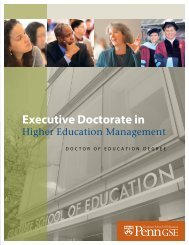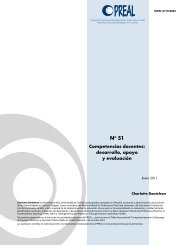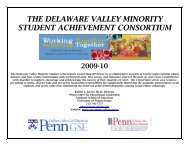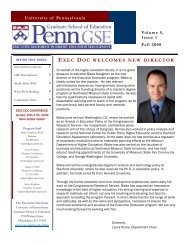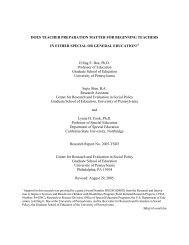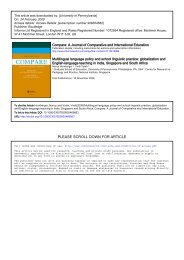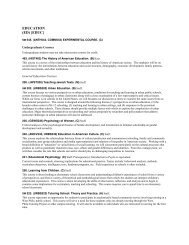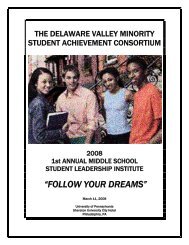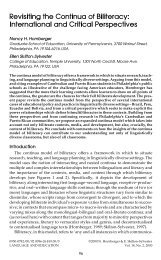Philadelphia Daily News, November 9, 2007 - Penn GSE ...
Philadelphia Daily News, November 9, 2007 - Penn GSE ...
Philadelphia Daily News, November 9, 2007 - Penn GSE ...
Create successful ePaper yourself
Turn your PDF publications into a flip-book with our unique Google optimized e-Paper software.
Philly’s school of high marks - 500-student<br />
<strong>Penn</strong> Alexander excels - and academics<br />
elsewhere want to learn more<br />
<strong>Philadelphia</strong> <strong>Daily</strong> <strong>News</strong> (PA) -<br />
Friday, <strong>November</strong> 9, <strong>2007</strong><br />
Author: MENSAH M. DEAN,<br />
IN SCIENCE CLASS this fall, Maxwell Gontarek has been<br />
learning about genetic engineering by observing the<br />
offspring of two zebra fish - an albino father and a wild<br />
mother.<br />
“It’s fun,” Maxwell, 12, said of his time at the Sadie Tanner<br />
Mossell Alexander University of <strong>Penn</strong>sylvania Partnership<br />
School.<br />
“I’ve gone here so many years I don’t really want to leave,”<br />
said Maxwell, who plays stand-up bass in music class and is<br />
one of three seventh-grade representatives on Student<br />
Council.<br />
Meanwhile, Umar Farooqi, in his seventh-grade social<br />
studies class, has been learning about the trial and execution<br />
of Greek philosopher Socrates, convicted of corrupting the<br />
minds of the youth of Athens.<br />
“I love it. This school has good education, I love the building and the teachers are really cool,” said Farooqi, who has two<br />
younger sisters also enrolled at <strong>Penn</strong> Alexander and an older brother who has since graduated to Central High, a top<br />
academic magnet school.<br />
This is public education at one of <strong>Philadelphia</strong>’s most successful school “experiments.”<br />
Since opening its doors in 2001, just before the state takeover of city schools, the K-to-eighth-grade, West <strong>Philadelphia</strong><br />
school created from scratch by the school district and the University of <strong>Penn</strong>sylvania has become a success story in its<br />
neighborhood - and a model for school reform in other cities.<br />
Students interviewed said they were hooked on their school, from its engaging classroom lessons to the building’s unique<br />
design, which features plenty of windows and a sun-drenched atrium that is ringed by classrooms on three floors.<br />
“It just has a friendly atmosphere and the learning environment is really good,” Farooqi, 12, said of the 85,000-square-foot<br />
building. “It makes you feel welcome, I guess.”<br />
Educators nationwide are hooked, too - on the school’s test scores.<br />
UCLA called two weeks ago. The University of Arkansas at Little Rock recently sent two representatives to check out the<br />
school at 42nd and Spruce streets. The College of Charleston and Howard University, in the nation’s capital, have also been<br />
in touch.<br />
These universities want to understand how <strong>Penn</strong> created one of the city’s highest-performing public K-8 schools - while<br />
drawing students solely from the school’s surrounding (and, thanks to the school, rapidly gentrifying) neighborhood.<br />
The latest state standardized test scores show that 81.4 percent of the school’s students are proficient or advanced in math,<br />
and 80.3 percent are so in reading.
By comparison, across the <strong>Philadelphia</strong> School District, 44.9 percent of students are on target in math and 40.6 percent in<br />
reading.<br />
“The expectations are high and the curriculum is rigorous,” observed Sheila Sydnor, who was selected from 60 applicants to<br />
become the <strong>Penn</strong> Alexander School’s first and only principal.<br />
“I don’t think we teach just enough. We go beyond just enough, and that has made a difference,” added the 32-year district<br />
veteran.<br />
Despite <strong>Penn</strong> Alexander’s test results - which are also higher than the state’s average scores - there is one education<br />
organization that has never attempted to learn from the school: the <strong>Philadelphia</strong> School District.<br />
“I don’t get calls,” Sydnor said sheepishly.<br />
“We would love for the school district to call us more, but that’s hard,” said Ann Kreidle, a <strong>Penn</strong> Alexander parent who also<br />
is manager of <strong>Penn</strong>’s partnership schools with the school district.<br />
In addition to <strong>Penn</strong> Alexander, those include Wilson and Lea elementary schools, both of which <strong>Penn</strong> has managed since<br />
2002 as part of the state’s takeover of the district.<br />
<strong>Penn</strong> Alexander’s success has unfolded at the same time as the school district’s much-watched experiment of placing 45 lowperforming<br />
schools under private management.<br />
That experiment, a result of the state takeover, has frustrated critics who believe it has been more expensive and less<br />
successful than the district’s own internal reform efforts.<br />
While never conceding as much, the School Reform Commission this spring slashed funding to the seven outside<br />
management organizations and announced that come next fall, new reforms will be introduced at 70 schools that have never<br />
achieved adequate yearly progress, or AYP, under the federal No Child Left Behind law.<br />
<strong>Penn</strong> Alexander has always achieved AYP, according to Sydnor, helping 83 percent of last year’s eighth-graders earn<br />
admittance to top high schools, with nearly half being accepted at magnet Central High School.<br />
Sandra Dungee Glenn, chairwoman of the <strong>Philadelphia</strong> School Reform Commission, said the school district has not yet<br />
attempted to determine how <strong>Penn</strong> Alexander has been able to achieve its success.<br />
“I don’t know that anyone has taken a hard look in terms of, what is it that’s making it work?” she said. “Is it that extra<br />
investment from the university that’s paying for some special things there? That’s the kind of thing I think we need to take a<br />
closer look at.”<br />
John Frangipani, <strong>Penn</strong> Alexander’s regional superintendent, said the school has given the school district much to consider.<br />
“I think they are on the right track,” he said. “We have seven years of information to look at to see what has to be corrected<br />
and what’s worth doing over again.”<br />
One area of concern, he noted, is the gap between white and black students who reached the coveted “proficient” and<br />
“advanced” levels on the latest state reading and math test.<br />
In both subjects, just over 95 percent of white students reached those levels, while 70 percent of black students did so.<br />
“Why is a school like this that is getting so much more support not closing the achievement gap?” he asked. “So we have to<br />
look at both sides of the coin before we start replicating.”<br />
Sydnor said remedies now being used to close the gap include providing lagging students with an after-school program, and<br />
during school hours an hour or more of additional reading and math help each week.
Sydnor and <strong>Penn</strong> Alexander faculty members confirmed without reservation that the school’s success is directly linked to the<br />
partnership with <strong>Penn</strong>, which is much more hands-on than the school district contract allows for at Lea and Wilson schools.<br />
For starters, <strong>Penn</strong> contributes $1,000 per student annually at the 511-student school. The additional teachers hired with those<br />
funds help keep class sizes no larger than 17 students in kindergarten and no more than 24 students in first through eighth<br />
grades. (In the school district, by contrast, classes can be as large as 30 students in kindergarten through third grades, and 33<br />
students in fourth through 12th grades.)<br />
The school has a certified librarian, a full-time instrumental music teacher and an education technologist who oversees the<br />
school’s 350 laptop and desktop computers, which are in three labs, the library and all classrooms, Kreidle said.<br />
In addition, the school selects all of its own teachers and is aided by staff and student teachers from <strong>Penn</strong>’s Graduate School<br />
of Education, while regular field trips to <strong>Penn</strong>’s science lab and other facilities are invaluable, Sydnor said.<br />
“The university cares a lot about the fact that this is a neighborhood public school,” said Sigal Ben-Porath, an assistant<br />
professor who serves as faculty liaison between the graduate school and <strong>Penn</strong> Alexander. “It’s not a lab school, it’s not the<br />
children-of-the-[<strong>Penn</strong>]-faculty school. It’s a university-assisted, neighborhood public school.”<br />
Still, 20 percent of the students are related to <strong>Penn</strong> employees, Kreidle estimated.<br />
The school’s success has helped boost housing prices in the surrounding area, which could account for an unusual school<br />
district trend: <strong>Penn</strong> Alexander is becoming whiter.<br />
In 2002, 58 percent of the school’s students were African- American, while today the figure is 48 percent. Then, 19.4 percent<br />
of students were white, while today 29 percent are. The Asian population of 13 percent and Latino population of 6 percent<br />
have changed little.<br />
“I think a lot of people in the neighborhood are getting upset that it’s getting too gentrified, but the whole city is getting<br />
gentrified,” said Mary Goldman, education committee co-chair for the Spruce Hill Community Association.<br />
Parent Eugenia Hewwing said the school’s diversity was a draw and relief after her son, Christian Campbell, 7, experienced<br />
trouble fitting in as one the few African- American students at his former Lower Merion Township school.<br />
“I already see the improvement,” Hewwing said after volunteering at the school recently. “He actually likes going to school.<br />
He’s not coming home saying, ‘Mommy, the kids didn’t want to play with me.’ “<br />
Diversity is important to Mecky Pohlschroder, as well. The <strong>Penn</strong> microbiology professor was born in Germany and her<br />
husband is from Ivory Coast, in West Africa.<br />
While volunteering at the school where the couple has a son in first grade, Pohlschroder also praised the school’s embrace of<br />
parents.<br />
“I’m definitely not an odd person who is here,” she said, pausing from helping a group of first-graders write the letters “O”<br />
and “P.”<br />
“We often overlap,” she said of parents. “The fact that the teachers do allow the parents to come in is really nice for me. I<br />
know friends who say, ‘Oh, really? My teacher doesn’t want us to come in.’ “ *


